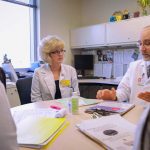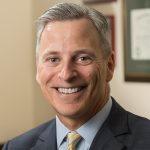CAPP Leaders Discuss How They Develop Physician Leaders at Washington, DC, Colloquium
The Council of Accountable Physician Practices partnered with CAPG — a trade association that promotes accountable care — to host a panel at the CAPG Colloquium held in Washington DC, on September 29, 2016.
The panel, “Physician Leadership in the Movement Toward Accountable Care,” featured four CAPP medical group leaders who discussed best practices for recruiting, training and developing physician leaders.
The panelists represented a diverse range of medical groups in size, geography and model. The panelists were Dr. Marc Klau, Southern California Permanente Medical Group; Dr. Philip Oravetz, Ochsner Health System; Dr. Lee Sacks, Advocate Physician Partners; and Dr. Nick Wolter, The Billings Clinic. Dr. Robert Pearl, Chair of CAPP and CEO of The Permanente Medical Group and the Mid-Atlantic Permanente Medical Group, served as the panel moderator.
“It will not be possible to move the country toward accountable, value-based care without strong physician leadership at all levels of the organization,” said Dr. Pearl. “Health care systems should view physician leadership as a capital investment for the future with huge ROI. The CAPP medical groups are committed to sharing their considerable experience to help all provider organizations face the challenges ahead.”
Development starts at recruitment
Over the course of the discussion, the panel touched on key aspects of their physician leadership development approaches. All agreed that leadership development starts at the moment of recruitment into the organization. “Every physician is a leader. We start with that assumption,” said Dr. Klau. “Take every physician on as a leader and then expand their capability, because you never know when you will need them.“

CAPG CEO Don Crane introduces the CAPP leaders and the importance of physician leadership to move the needle on accountable care.
Each of the medical groups has their own leadership training programs that have evolved over the years. Ochsner Health System, for example, has several tiers of leadership training that are designed to match physicians with their age and career experience. “We believe every physician is a leader by definition, but some exhibit their ability to lead more than others, or earlier in their career,” said Dr. Oravetz. “Our program exposes these folks to what a management career might look like.”
Regardless of the specifics of the training and development programs, the panelists overwhelmingly agreed that two critical traits for physician leaders are emotional intelligence and proven clinical excellence. “The best leaders are going to be visionary but anchored in reality,” said Dr. Klau.
“Self awareness is important to put on the table. What’s your humility? How do you develop people to create trust that’s necessary for good teamwork?” said Dr. Wolter.
Physician leadership as a strategy
Dr. Wolter stressed that physician leadership development should be considered outside of health care system payment as a strategy to improve care quality and patient outcomes. “No matter how the payment system evolves, if you leverage team care and leadership, that’s going to lead to better outcomes.”
Dr. Sacks agreed, saying that his group places leadership development at a premium. “It’s about improving care. The finances will follow,” he said. “Focus on what really resonates, which is improving outcomes.”
Following the discussion, the CAPG audience posed questions to the panel about the how-to’s of physician leadership development. The panelists agreed that physicians who aspire to lead their health system should start small. They mentioned that emerging physician leaders could join clinical improvement committees or attend the first stage of a leadership program as ways to determine if the track is right for them.
The panel was comprised of four of the 11 medical groups that contributed their case studies to CAPP’s five-part journal series about physician leadership development, which was published in the journal Health Care: Delivery Science Innovation. The articles can be read in full here.

CAPP medical group leaders gathered to discuss physician leadership at the recent CAPG Colloquium.
Photos courtesy of Thomas Van Veen of Documentary Associates





